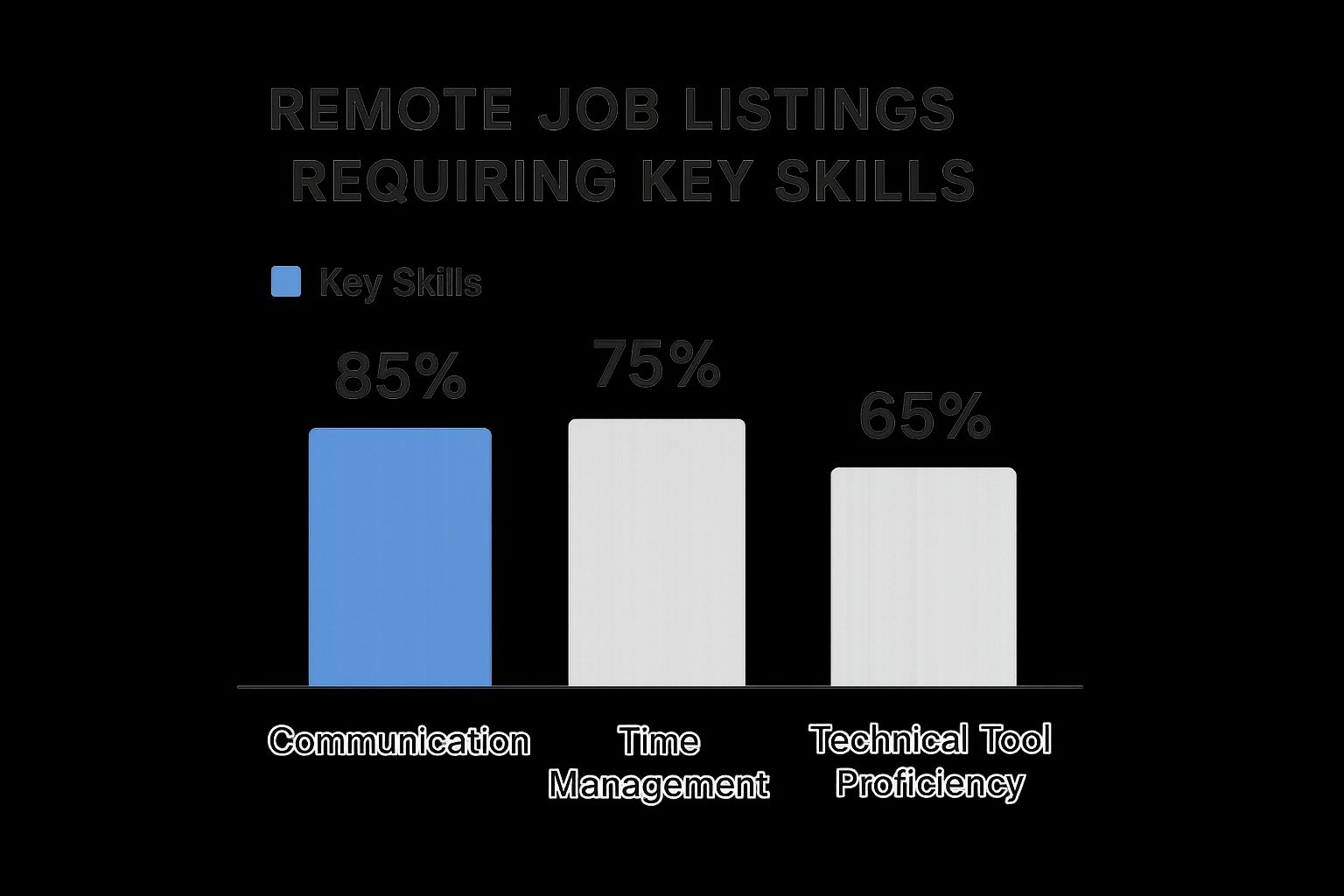How to Find Remote Jobs The Ultimate Guide

Before you even start scrolling through job boards, you need a game plan. Seriously. The most successful remote job searches begin with a little bit of introspection and a lot of preparation. It’s all about figuring out what you really want, what skills you bring to the table, and getting your resume and online presence in fighting shape. This upfront work is what separates a frustrating, endless search from one that lands you the right opportunity.
Build Your Foundation for a Remote Job Search

Jumping straight into applying for jobs is like trying to build a house without a blueprint. You might end up with something, but chances are it won't be what you wanted, and you'll waste a ton of time and energy along the way. The first, and arguably most important, step is to build a solid foundation by defining what you’re actually looking for.
Let's be real: the remote job market has changed. In 2024, we saw about 5.8 million remote jobs posted globally, which was a 20.5% drop from the year before. The opportunities are definitely still there, but the competition is steeper. Think about it—remote and hybrid roles get 60% of all applications but only make up 20% of the jobs listed. That discrepancy tells you everything you need to know: you need a strategy.
To help you get started, here’s a quick overview of the foundational steps we’re about to cover. Think of it as your initial checklist to make sure you're on the right track from day one.
Your Remote Job Search Quick Start Guide
| Phase | Actionable Step | Why It Matters |
|---|---|---|
| 1. Self-Assessment | Define your remote work non-negotiables (time zones, work style). | Prevents you from wasting time on roles that will lead to burnout. |
| 2. Skills Audit | Identify your existing skills and reframe them for a remote context. | Shows hiring managers you can thrive without in-person supervision. |
| 3. Asset Preparation | Optimize your resume with remote-specific keywords and achievements. | Helps your application get past automated filters and catch a recruiter's eye. |
This table is your starting point. By tackling these foundational pieces first, you’ll be applying for jobs with purpose and confidence, not just casting a wide, hopeful net.
Define Your Remote Work Non-Negotiables
Before you even think about applying, you have to get crystal clear on what a successful remote role looks like for you. This goes way beyond a job title. It’s about the day-to-day reality of the work. Start by asking yourself some tough but necessary questions.
- What’s my ideal work style? Do you thrive on the constant chatter of a virtual team and back-to-back video calls, or do you need deep, uninterrupted focus time to do your best work?
- What time zones can I realistically work? If you’re a night owl in California, a job that requires you to be bright-eyed for a 9 AM London meeting is probably not a great long-term fit.
- What kind of company culture am I after? Some remote companies are all about virtual happy hours and constant engagement. Others are much more asynchronous and hands-off. For some ideas on what's out there, our guide on the best companies for remote jobs is a great resource.
Answering these questions gives you a powerful filter. It allows you to immediately say "no" to jobs that, despite a great salary, would ultimately make you miserable.
Identify Your Remote-Ready Skills
Next, it's time to take stock of your skills and translate them for a remote world. The good news is that most of the skills you’ve developed in an office are perfectly transferable. The trick is to frame them in a way that proves to a remote hiring manager that you're ready to hit the ground running.
Don't just say you have "good communication skills." Get specific. Something like "expert in asynchronous communication using tools like Slack and Asana" is much more powerful.
The goal is to show, not just tell. You need to prove you can work effectively without someone looking over your shoulder. Highlight accomplishments that scream autonomy, self-discipline, and proactive problem-solving.
Imagine a project manager who used to run everything in person. Instead of just listing their old duties, they can reframe their experience to highlight remote-friendly skills:
- Digital Project Management: "Managed a 15-person cross-functional team using Trello to deliver a product launch two weeks ahead of schedule."
- Effective Documentation: "Created and maintained a comprehensive project wiki in Notion, reducing recurring stakeholder questions by 40%."
- Proactive Communication: "Instituted daily stand-ups via Slack and weekly summary emails to keep all stakeholders aligned across different departments."
This isn't just semantics; it's about translating your past successes into the language of remote work. It shows you’re not just hoping you can work remotely—you already have the skills to excel.
Craft a Resume That Gets You a Remote Job
Before a human ever sees your resume, it's almost certainly going to be scanned by a robot. And here's a sobering statistic: a staggering 75% of resumes get tossed out by an Applicant Tracking System (ATS) before they even reach a hiring manager. That's your first and biggest hurdle.
To land a remote job, a generic resume just won’t do. You need to build it from the ground up to prove you can deliver exceptional work from anywhere, without someone looking over your shoulder. It’s all about showing, not just telling, that you're built for this.
This image breaks down how a typical ATS works. It’s a flowchart showing how your resume is parsed and filtered before a recruiter ever lays eyes on it.
As you can see, getting past that initial software screen is non-negotiable.
Weave in the Right Keywords
The quickest way to get past the ATS is to speak its language. Pull keywords directly from the job description and sprinkle them throughout your resume. If they want experience with "distributed teams" or "asynchronous communication," you need those exact phrases tied to real accomplishments on your resume.
But don't just list buzzwords. You need to frame your entire experience through the lens of remote work.
- Self-Motivation: Don't just say you "managed projects." Try this: "Independently drove a six-month project from concept to launch, hitting every deadline without direct supervision."
- Communication: "Team player" is meaningless. Instead, try: "Kept a fully distributed team in sync across three time zones using Slack, Asana, and daily video check-ins."
- Tech-Savviness: "Proficient in Microsoft Office" is a given. Be specific: "Streamlined project workflows and boosted team transparency using Trello and Notion."
These tweaks might seem small, but they signal to both the software and the human reviewer that you get what it takes to succeed remotely.
Prove Your Value with Numbers
In a remote world, results are everything. A hiring manager needs concrete proof you can be productive and proactive on your own. The best way to provide that proof? Hard numbers. Vague claims get glossed over, but data makes an impression.
Your remote resume isn't a list of job duties; it's a highlight reel of your impact. Every bullet point should answer the question, "So what?"
Look at the difference here:
- Before: "Responsible for improving team documentation."
- After: "Overhauled the team's knowledge base in Confluence, creating a central hub that cut onboarding time for new hires by 30%."
And another one:
- Before: "Handled customer support inquiries."
- After: "Maintained a 95% customer satisfaction score over six months while managing 50+ support tickets daily in a fully remote setup."
This approach doesn't just list what you did; it shows you understand and can measure your own success—a killer skill for any remote employee.
Showcase Your Remote Tech Stack
Your comfort with remote work tools is a huge asset. Don't bury it. Create a dedicated "Tech Stack" or "Tools" section where you list the specific software you know how to use. This immediately tells a recruiter you won't need your hand held.
Break them down into categories so they're easy to scan:
- Project Management: Asana, Trello, Jira, Monday.com
- Communication: Slack, Microsoft Teams, Zoom, Google Meet
- Collaboration: Notion, Confluence, Google Workspace, Miro
Better yet, work these tools into your experience bullet points. For instance, "Kicked off a new marketing campaign by leading a virtual brainstorming session in Miro and delegating tasks in Asana." This shows you don't just know the tools—you know how to use them to get things done.
Find Quality Openings on the Best Remote Job Platforms
Once you've got a remote-ready resume, the real hunt begins. Where do you actually look? If your first instinct is to hit the massive, generic job boards, you're setting yourself up for a long and frustrating search. It’s like shouting into a void—you'll spend hours sifting through thousands of listings, many of which aren't even truly remote. That's a surefire recipe for burnout.
The smarter approach is to go where the best remote-first companies are already looking. Skip the noise and focus on platforms built specifically for remote work. These are more than just job boards; they're curated communities that attract employers who genuinely value and understand the distributed work model. This saves you a ton of time and connects you directly with legitimate, high-quality roles.
Go Beyond the Usual Suspects
You might stumble upon a hidden gem on a giant aggregator, but your time is far better invested in specialized sites. Why? Because these platforms actually vet their listings. They make sure every single job posted is authentically remote, which means you can stop worrying about applying for a role only to discover it’s actually a hybrid position or requires you to be in a specific, non-negotiable location.
Here are a few of the top-tier platforms you should be checking regularly:
- FlexJobs: This is a premium service, and for good reason. It comes with a subscription fee, but it pays for itself by weeding out the scams and junk. Every single opportunity is hand-screened by a real person, so you can search with absolute confidence.
- We Work Remotely: As one of the original and largest remote-specific job boards, this site is a powerhouse, especially for roles in tech and startups. Its no-fuss layout and the caliber of companies that post here make it a long-standing favorite.
- Remote.co: This platform offers a well-curated list of remote jobs, but it's also a fantastic resource hub with articles and advice. You'll often find roles from more established companies that are actively expanding their remote teams.
These sites are your gateway to companies where remote work is just how they operate—it's baked right into their DNA. You can also find a constantly updated list of opportunities right here by checking our own listings for remote jobs, which span a huge range of industries and experience levels.
This image really drives home the skills that these remote-first companies are looking for.

As you can see, technical skills are table stakes. What really sets candidates apart are the core "soft" skills— 85% of remote jobs require strong communication, and 75% look for solid time management. This shows that remote employers prioritize your ability to work autonomously and collaboratively above almost anything else.
Set Up Your Search for Success
Just browsing these sites isn’t a strategy. You need a system. The most efficient way to manage your search is by using advanced filters and setting up smart alerts. This turns your job hunt from a manual, time-consuming task into an automated machine that brings leads directly to you.
Don't just search for "marketing manager." Get hyper-specific. Try filtering for things like "US time zones only," "asynchronous," or even "4-day work week." The more criteria you add, the more relevant your results will be.
Most quality job boards let you save these custom searches and get email notifications. This is your secret weapon. Set up alerts for different variations of your ideal role or specific skill combinations. This way, you’ll be one of the very first people to see a new opening, giving you a critical head start on your application.
The remote job market is no longer a niche corner of the economy. In the United States, remote positions now make up over 15% of all job postings, a massive leap from just 4% back in 2020. Even more telling, projections show that by 2025, over 32.6 million Americans will be working from home—that's roughly 22% of the entire workforce.
Comparing the Top Remote Job Boards
So, where should you focus your energy? Each platform has its own flavor and caters to different types of job seekers. Let's break down some of the leading options to help you decide.
| Platform | Best For | Key Feature | Subscription Cost |
|---|---|---|---|
| FlexJobs | Job seekers who want vetted, scam-free listings across all industries. | Every job is hand-screened by a real person for legitimacy and remote flexibility. | Paid (starts around $25/month) |
| We Work Remotely | Tech professionals, developers, and marketers looking for startup roles. | High volume of quality tech jobs and a trusted reputation in the industry. | Free for job seekers |
| Arc.dev | Software developers seeking pre-vetted remote roles with top companies. | A rigorous vetting process for both developers and companies to ensure a high-quality match. | Free for developers |
| JustRemote | A broad range of roles, from design to customer service, with great filtering options. | "Permanent" and "Contract" toggles make it easy to find your desired employment type. | Free for job seekers |
Ultimately, choosing the right platform is about matching its strengths to your career goals. If you’re a developer, Arc.dev is a fantastic, specialized option. If you're in a non-tech field and want peace of mind, FlexJobs is probably worth the investment. By being strategic about where you look, you'll dramatically improve the quality of jobs you find and boost your chances of landing a role that’s a perfect fit.
Master Digital Networking to Find the Hidden Jobs

In the remote job hunt, a great resume gets you in the door. A strong network, however, can open doors you didn’t even know were there. You don't have the luxury of office chitchat or conference handshakes, so learning to build real connections from your keyboard is a game-changer. This isn't about spamming connection requests; it's about genuine relationship-building.
It all starts with making your LinkedIn profile work for you, not just sit there like a static CV. Remote-first companies are always on the lookout for talent, and a sharp, optimized profile makes you easy to find. Think of it as your digital storefront.
Make Your LinkedIn a Recruiter Magnet
That headline at the top of your profile? That’s your most valuable real estate. Don't just list your job title. Use it to broadcast your value and your interest in remote work. Instead of a flat "Content Marketing Manager," try something with more punch: "Content Marketing Manager | SEO & B2B SaaS | Seeking Fully Remote Opportunities." See the difference?
Next, give your "About" section a complete overhaul. This is your chance to tell a story. Talk about your experience thriving in autonomous roles, your communication style, and your comfort level with a distributed team. Be sure to weave in the names of remote collaboration tools you're proficient in—think Slack, Asana, or Miro. This shows you can plug right into their existing workflow.
But having a great profile isn't enough. You have to be active.
- Follow and Engage: Follow the remote-first companies you'd love to work for. A thoughtful comment on a company post can catch the eye of a hiring manager far more effectively than a cold application.
- Share Your Expertise: Post articles and insights about your industry or the future of remote work. This positions you as someone who's not just looking for a job but is actively engaged in their field.
- Join Niche Groups: Find LinkedIn groups dedicated to remote work in your industry, like "Remote Marketers" or "Distributed Engineering Teams."
This consistent activity does more than just make you look good; it feeds the LinkedIn algorithm, making you more visible to recruiters who are actively searching for candidates like you.
Find Your Tribe in Online Communities
Beyond LinkedIn, some of the absolute best remote jobs are found in niche online communities. These are the digital water coolers where industry pros swap advice, share tools, and—most importantly—post job openings that never hit the major job boards.
Look for industry-specific Slack or Discord channels. A content marketer, for instance, might join a community like "Superpath" or "Content Marketing Collective." These places are goldmines for connecting with people who can refer you or offer invaluable inside information.
The golden rule when joining any new community is to give before you ask. Don't show up on day one and post, "Anyone hiring?" Spend the first week or two adding value. Answer questions, share a helpful resource, or offer constructive feedback.
By doing this, you build social capital. When you eventually mention you're looking for a new remote gig, people will be eager to help because they already see you as a contributing member of the group.
Write Outreach Messages That People Actually Reply To
So you’ve found someone you want to connect with—a hiring manager at your dream company or a professional in a role you aspire to. Now what? A generic "I'd like to connect" request is the digital equivalent of a limp handshake. It’s a wasted opportunity. You have to be specific, personal, and respectful of their time.
Here’s a simple, non-pushy approach for an initial message that gets results:
"Hi [Name], I saw your recent post about [Specific Topic], and it really resonated with me. I'm a [Your Role] with a passion for [Your Industry], and I've been following [Their Company]'s work for a while. I'm currently exploring new remote opportunities and would love to connect and learn more about your experience at [Their Company] when you have a moment."
This works because you're not asking for a job. You're starting a conversation based on a shared interest. It proves you've done your homework and are genuinely interested in them and their company, which makes them far more likely to hit "reply."
Ace Your Video Interview and Spot Job Scams

Getting the interview is a huge step, but for remote roles, this is where the real test begins. You’re not just a candidate anymore; you're suddenly the producer, set designer, and IT support for your own interview. How you handle a video call is a direct reflection of how you'll handle working remotely.
At the same time, this is when you need to be most on guard. The more popular remote work becomes, the more sophisticated the scams get. Learning to spot the red flags isn't just a good idea—it's crucial for protecting your time, your personal information, and your wallet.
Setting the Stage for a Flawless Video Call
Before you say a single word, your environment is already making an impression. A cluttered background or bad lighting can come across as unprofessional or a sign that you lack attention to detail. You don't need a Hollywood set, just a clean, quiet space where you look and sound your best.
First things first, check your background. A simple, neutral wall or a tidy bookshelf works perfectly. A common mistake is sitting with a window directly behind you, which will cast you in shadow. If you can, face a source of natural light—it's the most flattering.
Next, get serious about testing your tech.
- Check Your Connection: Run a speed test. If your Wi-Fi can be unreliable, have a backup ready, like your phone's hotspot.
- Do a Dry Run: Grab a friend and do a quick test call on the same platform the interview will be on, whether it's Zoom, Google Meet, or something else. Is your mic clear? Is your camera positioned at eye level? This is the time to find out.
- Kill All Distractions: Silence your phone, close every unnecessary browser tab, and shut down any app that might send a notification. That little ping can completely throw you off your game.
Remember, a smooth technical setup shows you’re prepared and that you respect the interviewer’s time. It’s a subtle but powerful signal that you’re a pro who can thrive in a remote setting.
Mastering Virtual Body Language and Rapport
On video, your non-verbal cues are under a microscope. You have to be much more intentional to create the energy that comes naturally in person.
Sit up straight, and try to look directly into your webcam when you're speaking, not just at the person's face on your screen. This creates the feeling of direct eye contact. Use hand gestures as you normally would to add a bit of life to your presence.
A real smile is your best tool for building a connection. Listen closely, and nod to show you're following along. It might feel a little awkward at first, but these small things make you seem more confident and engaged, helping you build a genuine rapport through the screen.
How to Identify and Avoid Remote Job Scams
The anonymity of the internet is a scammer’s best friend, and the remote job market is a major target. They play on the excitement and urgency of finding a great role. Your best defense is knowing what to look for.
The shift to remote work has been massive. By 2025, it's expected that around 28% of the global workforce will be remote. While this opens up amazing opportunities, it's also attracted plenty of bad actors. You can learn more about the global impact of remote work from Velocity Global.
Keep an eye out for these classic red flags:
- Sloppy Communication: Emails full of typos and glaring grammar mistakes are a dead giveaway. So are messages from generic personal email addresses (like
company.recruiting@gmail.com). Real businesses almost always use their own domain name. - Overly Vague Job Descriptions: If the role, duties, and pay seem fuzzy or just too good to be true, be suspicious. A legitimate job post will have clear, specific requirements.
- They Ask You for Money or Sensitive Data: This is the brightest red flag of all. No legitimate employer will ever ask you to pay for equipment, training, or background checks. Never give out your bank account or social security number until you have a signed, verifiable offer in hand.
- A Sketchy Interview Process: If they want to conduct the entire "interview" over a messaging app like Telegram or through text chat only, it's almost certainly a scam. Real companies want to see you and talk to you.
When something feels off, trust your gut. Do your homework on the company, check their official website and LinkedIn page, and see what current or past employees are saying. For more tips, check out our in-depth guide on how to spot and avoid common remote job scams. A little diligence goes a long way in making sure your remote job search is both successful and safe.
Common Questions About Finding Remote Work
https://www.youtube.com/embed/PpbhaVjV2QI
Diving into the remote job hunt can feel a bit overwhelming, and it's totally normal for questions to bubble up along the way. Getting answers to these common questions will help you feel more confident and avoid some of the typical traps that can stall your progress.
Let's break down some of the most frequent things people ask when they're figuring out how to find a remote job.
How Can I Find Entry-Level Remote Jobs with No Experience?
This is a huge one. When you're just starting out, the key is to shift how you think about "experience." Instead of focusing on a lack of traditional office jobs, you need to highlight your transferable skills.
Think about it: have you managed complex school projects, done volunteer work, or even organized a local event? These experiences build skills like self-discipline, time management, and digital communication—all things remote employers desperately need. You're showing them you can be trusted to get things done on your own.
A few roles are often a great fit for people starting out:
- Customer Support: If you're a great communicator and a natural problem-solver, this is a perfect place to start.
- Data Entry: Companies need people who are detail-oriented and efficient. It's a solid way to get your foot in the door.
- Virtual Assistant: This is a fantastic path if you're organized and can juggle various administrative tasks.
I always tell people to build a small portfolio or even take on a couple of small gigs on a platform like Upwork. It's concrete proof you can do the work and shows a hiring manager you're a self-starter.
Should I Tailor My Resume for Every Remote Job Application?
Yes. One hundred percent. Sending out the same generic resume for every opening is like throwing it into a black hole, especially in the remote world where a single job post can attract hundreds of applicants.
Your best friend here is the job description itself. It’s basically a study guide for what the company’s hiring software (the ATS) and the actual human manager are scanning for.
If the description mentions "asynchronous communication" or "experience with Trello," you better believe those exact phrases should be somewhere in your resume. It's not about lying; it's about connecting the dots for them.
So, instead of a vague bullet point like "Managed team projects," you could rephrase it to: "Managed a distributed team's workflow using Trello, ensuring project milestones were met in a fully asynchronous environment." See the difference? That small tweak speaks their language and can be the reason you get an interview.
Ready to find a legit remote role without worrying about scams or "hybrid" surprises? RemoteWeek curates a job board with thousands of fully remote positions from companies you can trust. Start your search today on RemoteWeek and find your place in the remote world.
